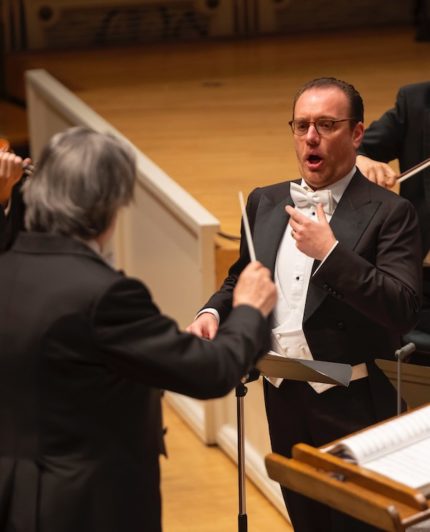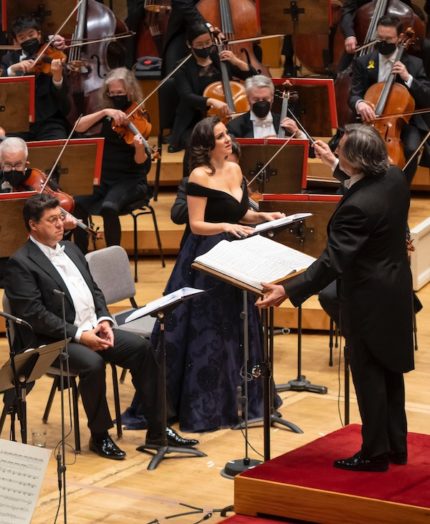Verdi vittoria: Muti, CSO wrap season with a thrilling “Un ballo in maschera”

One wonders what Giuseppe Verdi would have thought of a performance of his opera A Masked Ball in which the entire audience is wearing masks.
Riccardo Muti is closing the Chicago Symphony Orchestra’s season with Un ballo in maschera, which opened Thursday night at Symphony Center. This is the fifth and final Verdi concert opera of the Italian conductor’s tenure as CSO music director. Un ballo will be repeated Saturday and Tuesday.
Premiered in 1859, Un ballo in maschera caused the composer no end of battles with the censors. Originally called Gustavo III and set in late 18th-century Sweden, the plot of a love triangle in which a reigning king is assassinated onstage was deemed unacceptable due to contemporary political concerns. A change of location to 14th century Florence didn’t pass muster either; to get the opera approved, the frustrated composer finally moved the locale to Boston where the sovereign became governor of Massachusetts.
Thus Un ballo became, begrudgingly, the only Verdi opera set in America. Changing the conspirators’ names to Tom and Samuel was the only concession to the new setting, and there is nothing in the opera to suggest colonial Massachusetts, much less Boston. (Though one can imagine the duo hatching their plot at the Union Oyster House.)
The governor Riccardo is in love with Amelia, the wife of his best friend and trusted advisor Renato. Despite his popularity with the people, plots against the governor’s life are afoot, which Renato warns him about. The fortune teller Ulrica also predicts an impending death for Riccardo, which he laughs off. Renato discovers Riccardo in a midnight meeting with Amelia, and, furious at what he believes (erroneously) to be a betrayal by his wife and close friend, secretly joins the assassins. Riccardo has decided to send Renato away to end his obsession with Amelia, yet it is too late. At a festive masked ball, Renato kills the governor. In his final moments, Riccardo tells Renato that his wife is wholly innocent of adultery and he forgives his friend, asking his ministers to do the same.
Un ballo is among the richest operas of Verdi’s middle period, with a striking depth of characters and varied palette of orchestral colors. The opera deftly mixes intense drama with lighter moments, offering fizzing ensembles and soaring arias for Riccardo, as well as prime showpiece opportunities for the other four principals.
Muti looked a bit haggard Thursday night, but that was the only sign of the positive Covid test that forced him to withdraw from last week’s concerts. He led the CSO, CSO Chorus and soloists in a rousing, blood-and-thunder performance with customary podium vitality and concentration. Some of the souped-up climaxes went over the top, with Muti, atypically, burying the singers at the end of Act 1 and a couple places elsewhere. Yet the performance was undeniably thrilling with ceaseless dramatic momentum and crackling theatricality, even sans sets and costumes.
In addition to a consistently buoyant rhythmic lift, Muti was especially inspired in highlighting the subtleties and pastel hues of Verdi’s scoring—as with the hushed violin counterpoint under the woodwinds in the opening Prelude, and the string quartet in the final moments. It is emblematic of the care taken with this performance that Muti divided the ensembles in the title ball of Act 3 with the 12-member wind banda off to the left and the quartet above them in the balcony.
Muti has cast his Chicago operas consistently well, and such was largely the case once again with this final installment in the Verdi series.
Un ballo is one of the few Verdi operas with a juicy tenor role at the top of the cast, and Francesco Meli made the most of his opportunities. Following his CSO debut as Macduff in Muti’s Macbeth of 2013, Meli was an impressive Radames in Muti’s Aida three years ago.
The Genoa native possesses an ample voice and if his earnest vocalism missed some of Riccardo’s charm and reckless bravado, Meli sang with unfailing fervor and rich Italianate tone. He may have been pushing a bit, with his voice breaking momentarily at the end of the Act 2 love duet, “O quel soave brivido.” Taking an offstage respite during the long, Riccardo-less opening scene of Act 3 seemed to help, and Meli returned to bring fine heroic tone and sensitivity to the opera’s finale.

Luca Salsi was Renato, Riccardo’s friend who turns against him. A commanding Macbeth in Muti’s CSO performances nine years ago, the Italian baritone’s instrument has darkened in the intervening near-decade and grown burly in timbre. If his voice now feels somewhat low for this part, Salsi provided an idiomatic and authoritative portrayal. In “Eri tu”—one of Verdi’s finest arias for baritone—Salsi delivered a highlight of the evening. He communicated not just the usual stentorian anger at Riccardo but, with great emotional immediacy, the psychic desperation of a man devastated by what he believes is his wife’s betrayal.
The wild card in the cast was Joyce El-Khoury as Amelia, the center of the opera’s love triangle. The Canadian singer’s light soprano is manifestly slender for this role and she simply didn’t have the power nor the tonal opulence to ride the surging waves of her arias. That said, El-Khoury sang with greet feeling and sensitivity, affectingly so in “Morro, ma prima in grazia.”
As Ulrica, Yulia Matochkina delivered an estimable performance as the mysterious fortuneteller. While the Russian mezzo’s voice didn’t quite possess the ideal contralto depths, she was a compelling presence in Act 1, making her ominous imprecations jarringly dramatic, and singing with fire and searing intensity.
Damiana Mizzi proved ideal as Oscar, Riccardo’s page. In this trousers role, the soprano brought the requisite bright tone and coloratura flair to her lighthearted arias. More than most of the cast, the Italian soprano succeeded in fully painting a character in this concert format, with facial expressions and reactions that reflected the ongoing action.
Seated behind the principals, bass-baritones Kevin Short and Alfred Walker made a fine, subterranean-voiced duo as the conspirators Tom and Samuel, amusing in their sung laughter at Renato’s discomfiture in Act 2.
Baritone Riccardo Jose Rivera was a big-voiced Silvano and Lunga Eric Hallam and Aaron Short made solid cameos in small roles.
Donald Palumbo, chorus master of the Metropolitan Opera, prepared the CSO Chorus, which sang with sumptuous and majestic power, overwhelmingly so in the ensemble climaxes.
The orchestra was at its finest as it often is in these Muti-led Verdi performances. In addition to the gleaming corporate refinement and sonorous dramatic punch at climaxes, individual musicians shone in their spotlighted moments—none more than Scott Hostetler and John Sharp, in their aria obbligato solos, for English horn and cello, respectively.
Un ballo in maschera will be repeated 7:30 p.m. Tuesday. cso.org